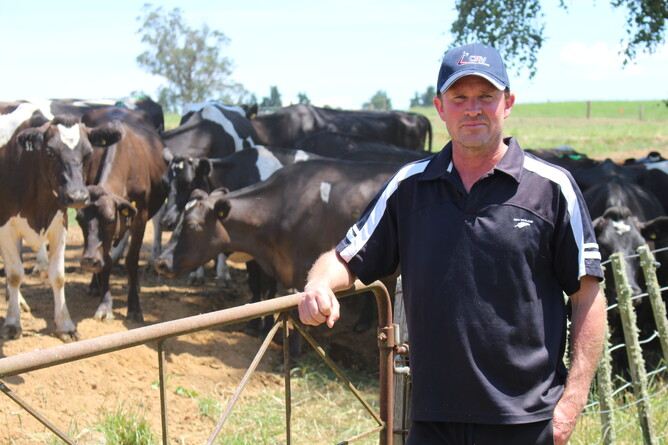Mathew Karl left his job as a bricklayer to become a dairy farmer seven years ago, and it was one of the best decisions he’s ever made.
The 38-year-old currently milks 300 mixed-breed cows on 100 hectares at Ryburn Road, in the Ohaupo area, between Hamilton and Te Awamutu.
“He’s had fantastic results,” says CRV Ambreed Field Consultant for Te Awamutu/Te Pahu Debbie Young, who has been working with Mr Karl. “A lot of it is done to the effort he’s put in, he’s grown his cows beautifully. He’s the kind of person you love dealing with, as he’s making a real effort so you want to see him do well.”
Mr Karl, his wife Kate and two young children love the farming life. As a fifth-generation farmer, he’s working the farm he grew up on. “It’s fair to say my father [Ross Karl] had a big influence on me coming back into farming. I wanted to be working in an industry that was part of something bigger, and could see a positive future in farming.”
He is proud of his new crop of two-year-old cows, and justifiably so. The 75 Friesian heifers, bred from CRV Ambreed genetics, are excellent, healthy milking cows, delivering good results.
“Last year’s heifers produced an average of 1.7 kg MS/day, but this crop of heifers is at 1.8 kg MS/day and the top heifer is at 2.3 kg MS/day,” says Mr Karl. “They are doing really well.”
Mr Karl was looking to improve his herd, and has used genetics to do it. Good udders were at the top of the list, along with small, compact framed animals with nice rumps and good hooves.
Mr Karl is particularly pleased with the excellent traits coming through, thanks to CRV Ambreed’s genetics. “The big thing is the udder composition,” says Mr Karl. “I think using CRV Ambreed genetics have worked, as the two-year-olds have got fabulous udders. I also like all the hooves on these girls, they sit right.”
With extra care and attention, including a diet of meal through to March, the heifers were 460kg, on average, when they went out grazing in April. “They are big, healthy cows. And 90 per cent calved in the first three weeks, which is a massive statistic,” says Mr Karl.
Mr Karl has been with CRV Ambreed for four years, and says the advice and support he’s received from CRV Ambreed has made all the difference.
“With Debbie, it’s a lot more personal and that relationship is important, much more so than with other [genetics] companies. She came and spent the time talking to me about what I wanted [with the herd].”
Ms Young visited Mr Karl at his farm to do a herd walk with him – and together they talked and planned. “We talked about what he wanted to achieve in the future and what kind of cow he wanted,” says Ms Young.
She created a six-bull pack to meet his needs. “I always say to clients that it’s a long game, and it’s a 10 year process to get the herd you want,” says Ms Young.
The first group of cows were inseminated in 2014, calved in 2015 and now milking and having calves themselves in 2017.
Mr Karl understands that genetic gain is a long-term strategy, but is delighted that he is already seeing positive results with his heifers.
“It’s exciting times. The udder formation, if it continues to improve, which it feels like it has – and the heifers getting back in calf again so easily – I look forward to what the next generation brings,” says Mr Karl. “That takes us towards the CRV message of ‘better cows, better life’ right there. Over time we can make gains [with the herd] and that’s exciting.”
Mr Karl also benefits from other CRV Ambreed products and programmes including Herd Testing, Estrotect Heat Detectors, Sire Match, AI Services and Eartags.
CRV Ambreed’s Estrotect Heat Detectors have been a successful product, says Mr Karl, and this season is the fourth time he has used them. The business card-sized patch sits on a cow’s rump, and with each bull mount, the surface gradually changes from silver to a bright colour to alert the farmer that a cow is on heat and ready to mate.
“I use them for pre-mating and I find they help us more accurately predict the best time [for artificial insemination] so we don’t go ahead too early with AI. They are really easy to put on, and my staff find them easy to use. I prefer them to tail painting because you don’t have to touch it up all the time. Estrotect lasts three weeks.”
Mr Karl is also a fan of CRV Herd Testing, which is a valuable way for farmers to identify the high and low performers in a herd. “Herd testing is great,” says Mr Karl, who says he values it for its accurate and up-to-date information.
SireMatch has also been a valuable tool. “I find SireMatch great because it feels like there is no guess work. It’s about giving things a go, and it’s pretty accurate,” says Mr Karl. SireMatch is a paper report that can be tailored to a herd and farming situation by CRV’s experienced consultants, and helps to prevent inbreeding and genetic defects using the farm’s cows’ pedigree information.

